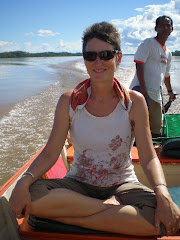The pace
of the jungle never seems to change. Yes, there is WiFi now at the lodges and
even one of our communities on the Amazon (Palmeras II) now has it for the school. Almost everyone--or at least someone--in even the remotest community
has a cell phone, canoe with a motor, a few solar panels scattered about which
light lights and run communal TV’s for entertainment at night. But as a whole,
the rhythm of life continues as it always has—the river goes up and down
seasonally, rice is planted and harvested, fields are cleared for planting, fish are caught,
music and celebration (along with masato or jungle beer) make regular
appearances. Kids go to school but it’s a casual and flexible approach. Moms
cook, nurse babies, and wash clothes; dads hunt, fish, farm and care for their
families with regular home repairs and improvements when extra money
allows—like a metal roof instead of palm fronds. I continue to believe that one
day, when the “grid” of our lives implodes--and we don’t have a clue how to
function outside our technical, electricity-driven world—the folks who live on the
river and in the rainforest will carry on.
They
won’t notice the difference much and they will simply continue to do what they
do. The jungle will continue to grow
and recover from the many assaults it regularly endures from our Western need
for more wood, more oil, and more beef. When I read world events from
here—ISIS, ebola, Syria, the falling stock market, shrinking middle class,
useless politicians—it feels very much like I’m not part of that. I can be
immersed in a place that offers peace, solitude and life-giving reassurance
that even if we (those from the West) muck it up beyond recognition, the humble
people from the rain forest—and the rainforest itself—will heal and grow and
carry on. Ultimately, I don’t feel quite so discouraged by the things I read
happening “out there”. It would be wonderful if everyone could find that one
place, as I've found, that feeds their soul.
Too much
has happened at CONAPAC during the last few months to share it all but the most
important thing has been our annual water program audit, handled by graduates
students and professors from the University of Colorado-Boulder. The students were here this past summer for a
month and did extensive, but random, surveys in 15 rainforest communities. Their report has just been delivered and is
available on the CONAPAC website. www.CONAPAC.org Overall, things are trending in the right direction with consistent
usage rates continuing to climb. However, the report made it clear that our
work is not complete. We must continue to "up our game" with more operator training, regular reviews of accounts, and
overall mentoring of communities—encouraging them to make drinking clean water
a top priority in the life of their community.
 |
| Cedro Isla-Sawyer water filters |
 |
| Sonoma Valley |
 |
| Doolin, Ireland |






